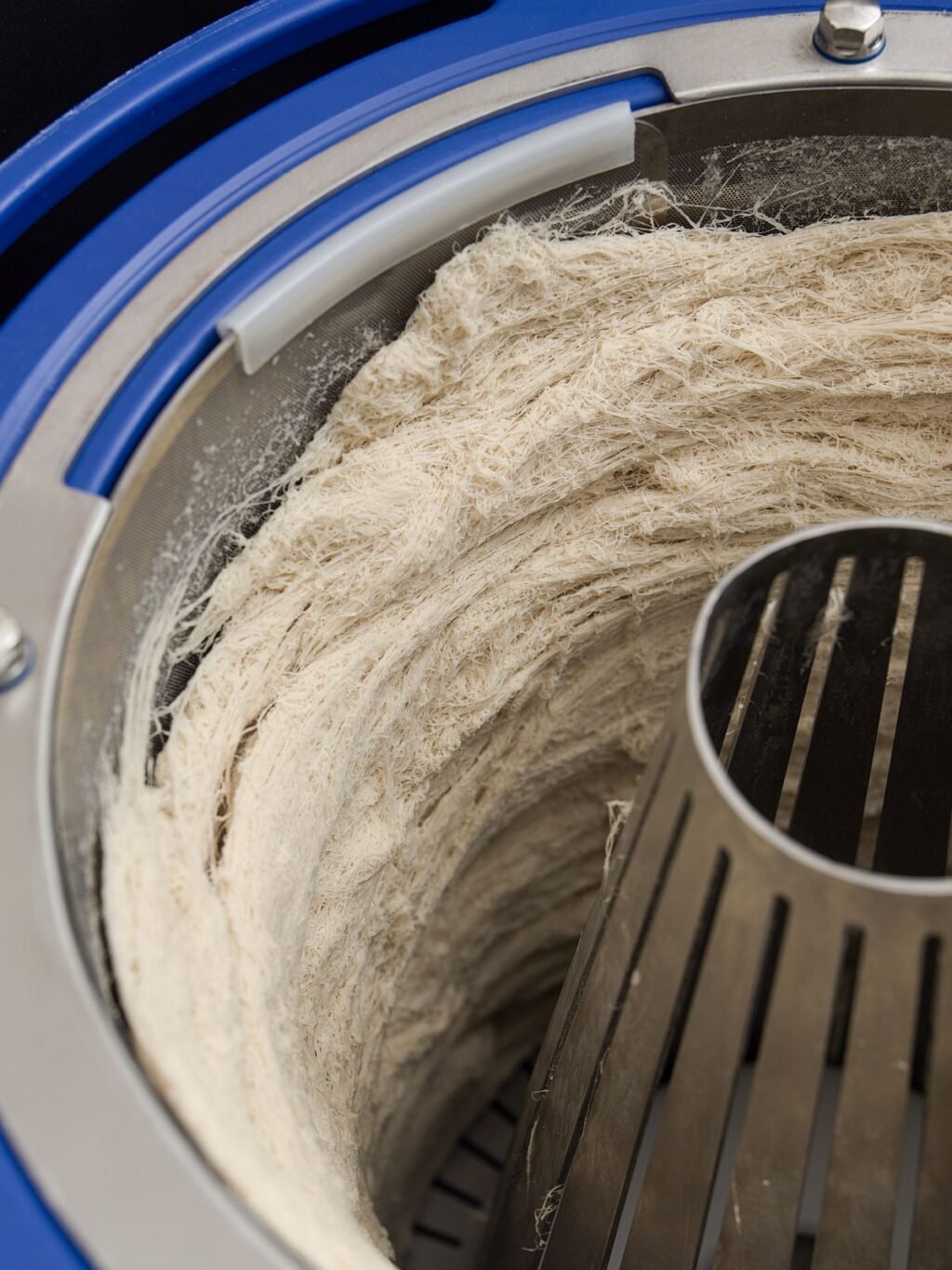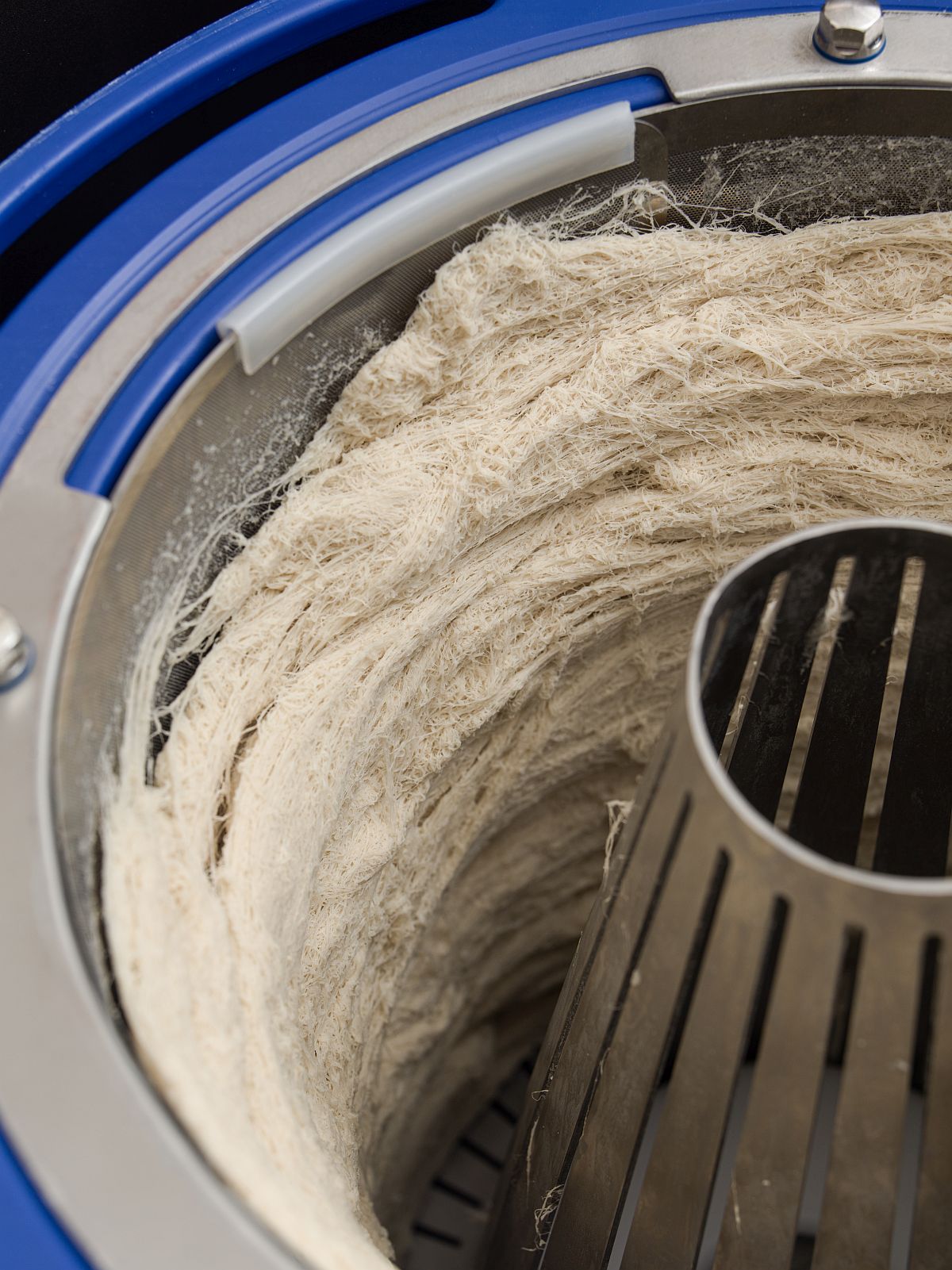
Boston-based startup Tender Food has rebranded as Lasso and raised $6.5 million to take its proprietary fiber spinning technology (“Lasso SpinTech”) beyond the alt meat sector into new categories from fruit snacks to pet food.
The funding round, led by Rhapsody Venture Partners with participation from Safar Partners, Claridge Venture Partners, Rivas Capital and others, follows a $11.5 million Series A announced in summer 2024. It will enable Lasso to launch its own brands utilizing the tech and license it to partners.
Developed by Kit Parker, Luke MacQueen, Christophe Chantre, and Grant Gonzalez at Harvard University’s Wyss Institute, Lasso SpinTech leverages centrifugal force to spin food ingredients into fibrous material with a unique texture.
The device, which the firm says looks like an “advanced cotton candy machine,” can be used with 1,000+ ingredient combinations and parameters to control fiber thickness, composition, arrangement, density, and moisture content. It was originally applied to alt meat through the Tender Food brand but is now being deployed to a wider range of products, said CEO Mike Messersmith, who took the helm at Lasso last year.
‘Like an advanced cotton candy machine’
The machines are about the size of a washing machine, use less energy than a toaster oven, operate at room temperature, and require a fraction of the capital and operating cost of texturizing technologies such as extrusion, said Messersmith, who was previously North American president at Oatly.
“The commercial scale system produces about 1,000 pounds of finished product per hour, or more than 1.5 million pounds of finished product per year, which is equivalent to more than 12 million protein bars.”
Over the past year, the Lasso team has created prototypes in snacks, bars, confectionery, and pet food, said Messersmith, who acknowledged that the alt meat sector had not delivered the exponential growth that many investors and industry stakeholders had hoped for back in 2020.
“At that point, it was the peak of the plant-based meat enthusiasm funding… and they saw some of the gaps and opportunities around how can you process plant proteins in a way that doesn’t require an extraordinarily long ingredient list,” he told AgFunderNews. “Texture was also an issue, and lastly cost. They had a strong hypothesis that this technology could enable a foundational throughput that would allow us to achieve a cost structure so that you could approach price parity.
“But obviously, the [alt meat] category has some challenges, particularly in the US. As a small company, it’s hard to justify putting the pedal down to the floor [on alt meat] in the moment we’re in right now. So we’re going from single application to a technology platform company with multi-category applications.”

Novel snacking concepts
In categories such as snacks, “There’s a lot of pressure from consumers and customers to bring more nutrition and cleaner labels without binders and gums, to bring novel textures and unique product offerings,” he said.
Lasso SpinTech can work with animal and plant-based proteins and a range of other raw materials from fruits and vegetables to mycoprotein, he said.
“We can make products with extraordinary nutrition and super clean labels that are affordable, including fruit and veg snacks without the added binders, gums, gels, and added sugar to hold them together. Fruit can be the first ingredient, combined with protein and fiber and we use our machine to weave them all together. I had a call the other day with a big fruit company about how to use its waste stream [ugly or unsellable fruit] and convert it from a cost center into a profit stream.”
Asked why Lasso plans to introduce its own consumer products in addition to pursuing a b2b tech licensing strategy, Messersmith said: “When you’re trying to create something new, there’s something powerful about actually seeing it in market, with consumers buying it and getting feedback. It creates more urgency for potential partners to want to move on it. When you’re just showing them prototypes in the boardroom, it all still feels a bit theoretical.”
He added: “We have been doing a ton of work over the past year looking at what we think are winning value propositions. And this is a big reason why I joined the company. I feel like in 2025, it’s never been easier to do a hyper-focused brand launch, which could mean we sell some things through the internet, some things on Amazon, get some small-scale brick and mortar distribution.
“It doesn’t mean our ambitions are necessarily to take that all the way to 10,000 doors and market ubiquity, but we feel like when we demonstrate the real world impact and application of our tech with products that are tangible, that people can see, brands will ask, can we work with that technology and put it into our factory? Could we let our sales team loose on this?”

The business model
While Messersmith acknowledged that some startups have run into trouble with this approach, given that b2b and b2c strategies require different skill sets and resources, it depends on why you are adopting this strategy, he said.
“It depends if you’re doing controlled, focused market launches to expedite these types of [b2b] partnerships, rather than as a response to a lack of belief or conviction in those partnerships. The question is, can we make it easy for a partner to say yes?”
As for potential partners, he said, “In my career I’ve been on the other side, and there’s just so much inertia and resistance to change, so I think that by launching products in the market, it will serve as an accelerator to those sorts of quality conversations [with potential partners].”
In the next year or so, he said, “There’s a couple things we hope to do. One is focused market launches of new category applications primarily in snacking and then there’s a couple of licensed projects which we hope to be able to announce in the coming months.”
The post Tender Food rebrands as Lasso, expands novel spinning tech beyond alt-meat appeared first on AgFunderNews.



